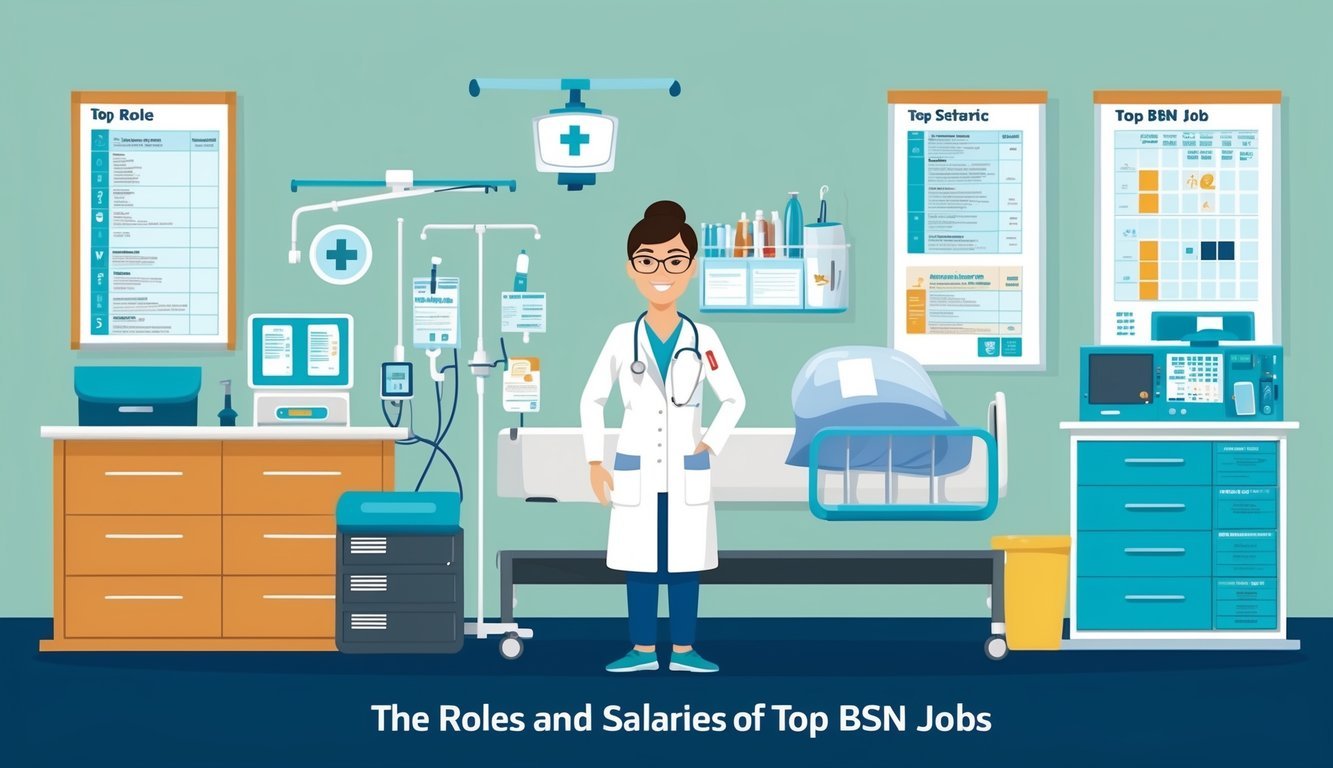Pursuing a Bachelor of Science in Nursing (BSN) opens doors to numerous career opportunities, placing you in a vital role within the healthcare field. The highest paying BSN jobs offer salaries that can exceed $130,000 per year, especially in states like California and Hawaii.
As the demand for skilled nurses continues to rise, it’s essential to understand not only the various roles available but also the potential earnings associated with each position.
Transitioning from a BSN program to a rewarding nursing career can significantly impact your financial future.
Many BSN jobs come with competitive salaries, including specialized roles such as Neonatal Intensive Care Unit (NICU) nurses, who can earn around $128,211 annually.
The variations in salary depend largely on your specialization and geographic location, with certain states consistently ranking as the highest paying for BSN professionals.
In this blog post, you will explore the highest paying BSN jobs, their responsibilities, and salary ranges.
Whether you’re just starting your nursing career or considering a shift in your current path, understanding the financial prospects associated with BSN roles is crucial for making informed career decisions.
Education and Certification Requirements

To pursue high-paying BSN jobs, you must meet specific education and certification requirements.
Understanding these prerequisites is essential for optimizing your career path and positioning yourself for upper-level nursing roles.
BSN Degree Fundamentals
To start your nursing career, obtaining a Bachelor of Science in Nursing (BSN) is crucial.
This degree typically requires four years of study at an accredited institution.
The curriculum includes core nursing courses, anatomy, pharmacology, and clinical practice.
You’ll also complete hands-on training through clinical rotations in various healthcare settings.
Upon completion of the BSN program, you must pass the NCLEX-RN exam to become a licensed registered nurse.
This qualification not only lays the foundation for your nursing career but also opens doors to advanced practice roles in the future.
Advanced Nursing Degrees
For those seeking higher-paying positions, pursuing an advanced nursing degree is beneficial.
A Master of Science in Nursing (MSN) allows you to specialize in areas such as nurse leadership or clinical education.
Programs typically take two years and involve both coursework and clinical practice.
Further, the Doctor of Nursing Practice (DNP) is the highest clinical degree available for nurses.
This program focuses on clinical training and leadership, preparing you for roles such as nurse anesthetist or clinical nurse specialist (CNS).
Both degrees significantly enhance your employment opportunities and earning potential.
Specialty Certifications
Earning specialty certifications can elevate your career and salary.
For example, becoming a Certified Registered Nurse Anesthetist (CRNA) or a Family Nurse Practitioner (FNP) requires additional training and certification exams.
These specialties generally require you to complete an accredited program that can take 1-3 years post-BSN competency.
Having such credentials can lead to roles with substantial salary increases, sometimes exceeding $100,000 annually depending on the state and healthcare setting.
Top BSN Roles and Salaries

In the nursing profession, various roles offer competitive salaries for those with a Bachelor of Science in Nursing (BSN).
Here are key positions that stand out due to their responsibilities and earning potential.
Anesthesia and Critical Care
As a Certified Registered Nurse Anesthetist (CRNA), you play a critical role in surgical teams, delivering anesthesia care that is essential for patient safety during procedures.
Your annual salary often exceeds $180,000, making it one of the highest-paying nursing jobs.
In the critical care setting, an ICU nurse has responsibilities that include monitoring patients with severe conditions and collaborating with physicians on treatment plans.
Salaries for critical care nurses typically range from $70,000 to $120,000, depending on experience and location.
Family and Psychiatric Care
Family Nurse Practitioners (FNPs) focus on providing comprehensive care to patients across all ages.
Your role includes diagnosing conditions and managing treatment plans, with an average salary around $100,000 per year.
In the realm of mental health, Psychiatric Nurse Practitioners (PNPs) assess, diagnose, and treat individuals with mental disorders.
Your earning potential can also be impressive, ranging from $90,000 to $130,000 annually, depending on the complexity of care you provide.
Informatics and Administration
Informatics Nurses blend nursing skills with IT knowledge to improve healthcare delivery systems.
This role involves analyzing data to enhance patient care and workflow, with salaries averaging between $80,000 and $110,000.
Nurse Administrators manage nursing departments, focusing on staffing, budgets, and policy implementation.
Your earnings in this position range from $85,000 to over $150,000, based on your level of responsibility and experience.
These specialized BSN roles not only offer attractive salaries but also provide fulfilling career opportunities in diverse healthcare settings.
Expanding Fields in Nursing
Nursing is evolving rapidly, leading to diverse and specialized professions.
As the healthcare landscape changes, new opportunities are emerging that can enhance your career prospects and earning potential.
Specialized Nursing Practices
Specialized nursing roles allow you to focus on particular areas of health care.
Roles such as Clinical Nurse Specialist and Pain Management Nurse require advanced training and skill.
-
Clinical Nurse Specialist: These practitioners improve patient outcomes through expert assessment and care in specific fields, like oncology or cardiology.
-
Pain Management Nurse: They address patients experiencing acute or chronic pain, developing care plans and interventions tailored to individual needs.
Other growing specialties include Hospice Nurse, focusing on end-of-life care, and Pharmaceutical Nurse, who provides patient education on medications.
Each of these areas offers rewarding work with competitive salaries.
Nursing in Technology and Informatics
The integration of technology in nursing is creating new career paths. Nursing Informatics combines nursing science with analytical sciences to enhance patient care.
In this field, you might manage health information systems, ensuring data integrity and security.
Proficiency in healthcare technology can position you as a valuable asset in any facility.
Additionally, roles like Travel Nurse leverage technology to provide services in various locations, offering flexibility and often higher pay.
Understanding and utilizing technology effectively can lead to new opportunities in nursing.
Leadership and Education
As healthcare becomes more complex, there is a growing need for skilled leaders and educators.
A Nurse Educator plays a vital role in training the next generation of nurses, emphasizing the importance of advanced practice and specialized knowledge.
You might also consider becoming a Legal Nurse Consultant.
This role allows you to apply your nursing expertise in legal cases, providing insights on medical issues.
Leadership positions often require further education and experience but offer the chance to influence nursing practice and improve healthcare outcomes significantly.
By pursuing these pathways, you can expand your career and positively impact the nursing field.
Career Trajectories in Nursing

Nursing offers diverse career paths that cater to evolving interests and ambitions.
You can explore various roles, including clinical practice, research, and leadership, each presenting unique opportunities and challenges.
Clinical Advancements
As a nurse, you can pursue clinical advancements through specializations.
These additional qualifications bolster your expertise and make you eligible for higher salaries and more responsibility.
Common specialties include critical care, pediatrics, and oncology.
Consider pursuing credentials such as the Certified Nurse Practitioner (CNP) or Certified Registered Nurse Anesthetist (CRNA).
According to Nurse.org, Nurse Practitioners can earn around $115,000 annually, with strong job growth projected.
Continuing education is vital for these roles.
Many employers offer tuition reimbursement for further studies, which can enhance your career trajectory significantly.
Research and Consulting
If you have a keen interest in advancing healthcare practices, a role as a research nurse might suit you.
In this position, you conduct clinical trials and contribute to the discovery of new treatments.
Research nurses often collaborate with medical teams and require robust analytical skills.
You must also have a solid grounding in ethics and regulations governing clinical trials.
Consulting roles are also an option, where you advise healthcare organizations on best practices.
This path can offer lucrative opportunities and typically requires expertise in healthcare operations and strategy.
Executive Leadership
In executive leadership positions, such as a Director of Nursing or Chief Nursing Officer, you play a crucial role in shaping nursing practice within an organization.
These leaders are responsible for overseeing nursing staff, budget management, and policy implementation.
The career outlook for executive roles is promising, with demand expected to grow.
According to the Bureau of Labor Statistics, nurse administrators and executives can earn upwards of $132,000 annually.
Building leadership skills through mentorship and professional development programs can prepare you for these positions.
Strong communication and management skills are essential to navigate the complexities of healthcare teams effectively.
Legal and Ethical Considerations in Nursing

As a nursing professional, understanding the legal and ethical frameworks governing your practice is essential.
This knowledge helps you navigate complex situations in various roles, such as a nurse midwife or occupational health nurse.
Understanding Medical Law
Medical law impacts your responsibilities and rights as a nurse.
Key areas include informed consent, patient privacy, and scope of practice.
- Informed Consent: Patients must understand and agree to treatments. Failure to obtain consent can lead to allegations of medical malpractice.
- Patient Privacy: The Health Insurance Portability and Accountability Act (HIPAA) mandates that you protect patient information. Breaches can result in significant penalties.
- Scope of Practice: Knowing your limits as a nurse is crucial. Each state has regulations defining what nurses, including certified nurse midwives, can and cannot do.
Familiarize yourself with local laws to provide safe care and minimize legal risks.
The Role of Nurse Consultants
Nurse consultants play a vital role in navigating the legal landscape of healthcare.
They provide expert advice on policies, regulations, and best practices.
- Risk Assessment: Nurse consultants evaluate systems to identify potential legal issues. This helps prevent malpractice claims.
- Education and Training: They offer training sessions on legal topics relevant to nursing. This enhances your understanding of medical law.
- Legal Representation: In cases of personal injury claims, nurse consultants can assist legal teams. They do this by providing necessary medical insight and documentation.
Their expertise is invaluable as healthcare continues to evolve, ensuring you remain compliant and informed in your nursing practice.

